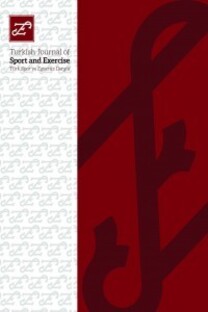Training Monitoring And Effect Of Training Variables On Wellness Score In Elite Male Fencers
Training monitoring, fencing, wellness, sRPE
Training Monitoring And Effect Of Training Variables On Wellness Score In Elite Male Fencers
Training monitoring, fencing, wellness, sRPE,
___
- 1. Askow, Andrew T, Alexa L Lobato, Daniel J Arndts, Will Jennings, Andreas Kreutzer, Jacob L Erickson, Phil E Esposito, Jonathan M Oliver, Carl Foster, and Andrew R Jagim. "Session Rating of Perceived Exertion (Srpe) Load and Training Impulse Are Strongly Correlated to Gps-Derived Measures of External Load in Ncaa Division I Women’s Soccer Athletes." Journal of Functional Morphology and Kinesiology 6, no. 4 (2021): 90.
- 2. Błażkiewicz, Michalina, Zbigniew Borysiuk, and Marek Gzik. "Determination of Loading in the Lower Limb Joints During Step-Forward Lunge in Fencing." Acta of bioengineering and biomechanics 20, no. 4 (2018): 3-8.
- Başlangıç: 1999
- Yayıncı: Selçuk Üniversitesi, Spor Bilimleri Fakültesi
Barbaros DEMİRTAŞ, Murat Can ÇEKEN, Onur ÇAKIR, Malik BEYLEROĞLU, Onat ÇETİN
Training Monitoring And Effect Of Training Variables On Wellness Score In Elite Male Fencers
Enver YILDIRIM, Ş. Alpan CİNEMRE, Hatice Yağmur ZENGİN
A Review Study of Physical Education Pedagogy in Turkey
Ekrem Yasin TABAK, Mehmet DALKILIÇ, Erhan DEVRİLMEZ, Fatih DERVENT
The Effect of Aerobic Endurance on Agility and Speed in Amateur Soccer Players
İbrahim Halil ŞAHİN, Ömer KAHRAMAN, Maya BUDAK, Turgut KAPLAN
Investigation of Fair Play Behaviors of Secondary School Students Participating in School Sports
Ahmet TEMEL, İbrahim Umran AKDAĞCIK
Rumeysa ALPER, Özlem YALÇIN, Hamdi PEPE
Mental Toughness Levels of Male and Female Football Players
Berzan ŞİMŞEK, Alpaslan KARTAL, Samet AKTAŞ
The Effect of Participation in Regular Tennis Exercise on Sportsmanship
